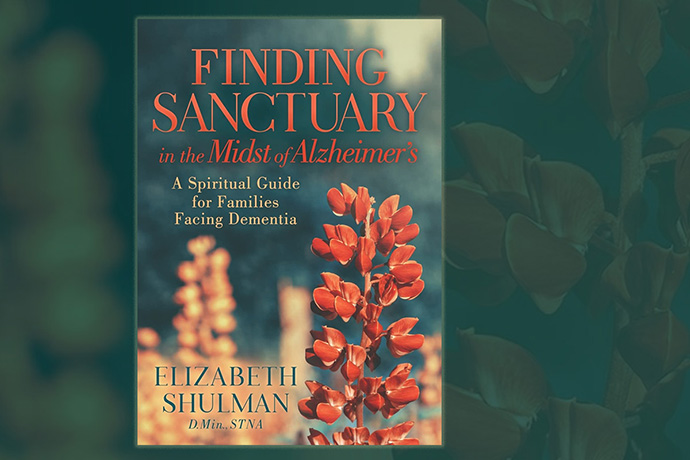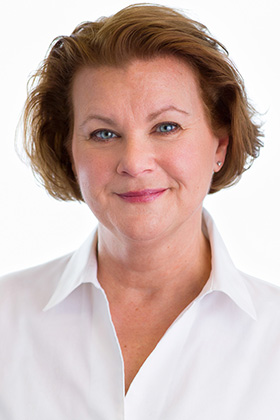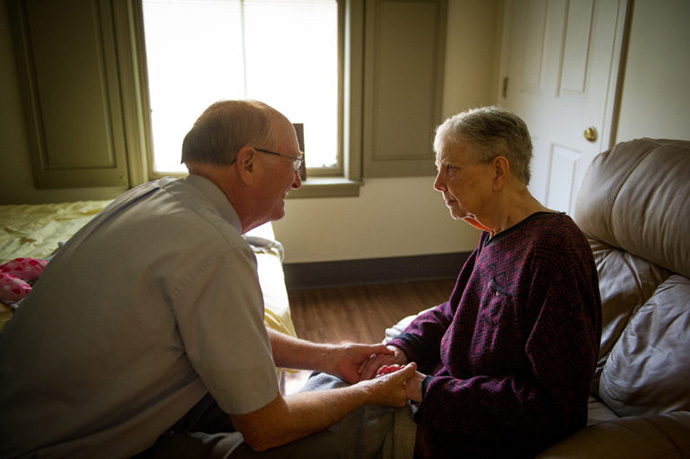
Key points:
- A new book by a former United Methodist pastor and health care chaplain offers group exercises to help care for caregivers.
- Elizabeth Shulman’s book suggests ways for congregations be in ministry with caregivers and to offer spiritual guidance.
- Effective ministry to caregivers of dementia sufferers will be progressively important as United Methodist congregations get older, says a retired bishop.
Sometimes something as basic as washing somebody's hair can make all the difference.
Imagine you're a husband taking care of a partner who is slipping away because of Alzheimer's disease.
"This one gentleman said to me, ‘You know what I would like? I would like someone to come and wash my wife's hair. I've never washed a woman's hair in my life,’” recalled Elizabeth Shulman, a United Methodist who's been a pastor, university researcher and health care chaplain over her 30-year career.
She is the author of "Finding Sanctuary in the Midst of Alzheimer's: A Spiritual Guide for Families Facing Dementia." The book features group exercises to empower caregivers and to help congregations be in ministry with them.

Photo courtesy of Elizabeth Shulman.
"I've experienced that people are happy to help out, but they don't know exactly how," Shulman said in an interview with United Methodist News. "With this book, I have a section on asking for help, how you do that.”
Lori Lamm, a member of New Beginnings Community Church in San Jose, California, takes care of her husband, who suffers with dementia. She has led a dementia caregiver group at the church for the past two years and has used some of the activities in Shulman's book.
"Dementia is a really scary, scary disease, and people don't want to be a part of it," Lamm said. "They say, 'I will pray for you' from a distance, but rarely want to engage with that."
To counter the normal depression a caregiver goes through, Shulman encourages them to consider that perhaps "God's chosen you for this."
With her husband now being cared for at a Veterans Health Administration facility, Lamm believes she has a duty even to his fellow patients when she visits.
"How am I projecting myself to those people?" she asked. "Are they seeing Christ in me? Are they seeing someone sad and depressed and angry and fed up?"
A typical lesson in the book tackles the loneliness and isolation caregivers often experience. It suggests Bible verses in Genesis and the Psalms and group discussions about when participants feel the most alone.
Retired Bishop Kenneth Carder, who cared for his wife, Linda, for 12 years as she went through dementia before passing away, serves as the chaplain at a memory care unit in South Carolina.
"I reviewed (Shulman's) book in manuscript, and I think she's doing good work," Carder said. "She's one of a growing number of people I see who are getting involved in (caregiver ministry) congregations."

Dementia starts with perplexing changes in a person that may be embarrassing, such as becoming defensive or aggressive or not taking care of personal hygiene, Shulman said.
"For spouses, it's very difficult because you're losing the very person that you would turn to for support," she said. "I have found that a lot of people try to cover things up to kind of protect their loved ones, so they don't really share what's going on."
But many times, family members or friends sense that something is wrong.
"To find people that you can share your experience with can really take some of the burden off, because I think caregiving is a very lonely experience for many people,” she said.
One of the most frustrating aspects of caring for someone with dementia is repetitive behavior and questions, said Shulman, who gives presentations about dementia care at churches and memory care units.
"It's not about being logical, it's about providing assurance," she said. "If that means answering the same question as though you are hearing it for the first time, then that's what you do."
Carder titled his book on the subject “Ministry with the Forgotten: Dementia Through a Spiritual Lens.” He believes sufferers of dementia are clearly among the “least of these” that Methodists are called to help.
Subscribe to our
e-newsletter
“These people are forgotten and, yes, they are in our congregations,” Carder said.
United Methodists today have an average age of around 57 or 58 years old, about 20 years older than the general population, Carder said.
“One out of nine persons over 65 have some form of cognitive impairment, other than just normal aging,” he added.
“These older congregations, perhaps one of their major callings is to be in ministry with those who are very old,” Carder added. “The most supportive community that many frail people have is their congregation.”
Such ministry is his calling “in these waning stages of my own life,” Carder said.
One uncomfortable question this brings up is: Will caring for people ailing and close to death take away resources from ministries to younger people that could encourage church growth?
Not so fast, Carder urges.
“These people have children and grandchildren,” he said. “I think one thing churches are interested in is what is offered for my children and youth, but I think the sandwich generation is interested also in what does the church offer my parents — my frail, elderly parents, maybe with dementia. … It can very well be a means of attracting those families.”
Shulman said the belief that things should be different often frustrates caregivers of dementia patients, but there are lessons in the stressful moments.
“I always go to Corrie ten Boom and Viktor Frankl, both Holocaust survivors, who not only survived their circumstances but thrived in their circumstances and found meaning in what they were enduring,” she said.
“When we can find the positive, even if it's just saying, ‘I can't wait to discover what the lesson is in this for me,’ and can maintain a more positive (outlook), it opens doors for God to provide practical solutions for things we don't know how to solve.”
Patterson is a UM News reporter in Nashville, Tennessee. Contact him at 615-742-5470 or newsdesk@umcom.org. To read more United Methodist news, subscribe to the free Daily or Weekly Digests.


